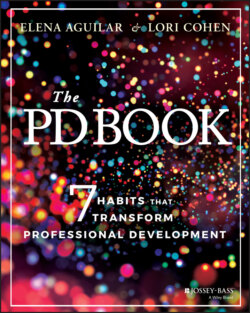Читать книгу The PD Book - Elena Aguilar - Страница 20
The Seven Habits
ОглавлениеHabits are behaviors that you enact so often that you internalize them and they become routine. For example, you probably brush your teeth every day without having to think about how to angle the toothbrush—you just do it. Once a behavior is a habit, it doesn't take as much cognitive, physical, or emotional energy as when you started.
Figure 0.1 How to Create Transformative PD: PARTY!
Many of the strategies we'll describe in this book might sound like they'd take a lot of time and energy—and they do at first. But if you practice them over and over, you'll eventually find yourself doing them with much less intentional labor than you needed at first. Once you reach a stage of mastery or what's also called unconscious competence (Broadwell, 1969), the habit will be ingrained—and possibly almost effortless.
But let's back up, because a habit emerges from a belief: You brush your teeth because you believe that dental hygiene is important and brushing will prolong the health of your teeth. Beneath every habit in this book are beliefs that uphold it. We will make those beliefs explicit to increase your investment in mastering the habits. Table 0.2 summarizes the habits and content of this book. You'll also see how the habit contributes to a condition for learning.
Table 0.2 The Seven Habits
| Habit & Chapter | Condition for Learning | Description |
|---|---|---|
| Determine Purpose (1) | Purpose | Transformative PD emerges from purpose. We identify and create purpose, and then we communicate it to learners and build their buy‐in. |
| Engage Emotions (2) | Audience | Human beings have emotions, and we engage our own emotions and those of others to create the conditions for learning. We respond to challenging emotions and create psychological safety for individuals and groups. |
| Navigate Power (3) | Audience | Power is always present, and when we're in hierarchical organizations, we must learn how to use it. We make choices about what kind of power we work from, how we use it, and how we respond to power struggles. |
| Anchor in Adult Learning Principles (4) | We act on the research about what adults need in order to learn. We can provide choice, honor agency, access prior learning, and make the learning relevant. | |
| Design Intentionally (5) | Routines | We honor the backgrounds of participants, consider the why behind design, and are deliberate in determining outcomes, selecting activities, developing learning structures, and sequencing learning. |
| Attend to Details (6) | Attending to details makes learners feel welcome, affirmed, valued, and psychologically safe. | |
| Facilitate Adaptively (7) | Technique | Developing self‐awareness, emotional intelligence, cultural humility, and clear communication enables you to respond appropriately to whatever happens in a PD session. |
